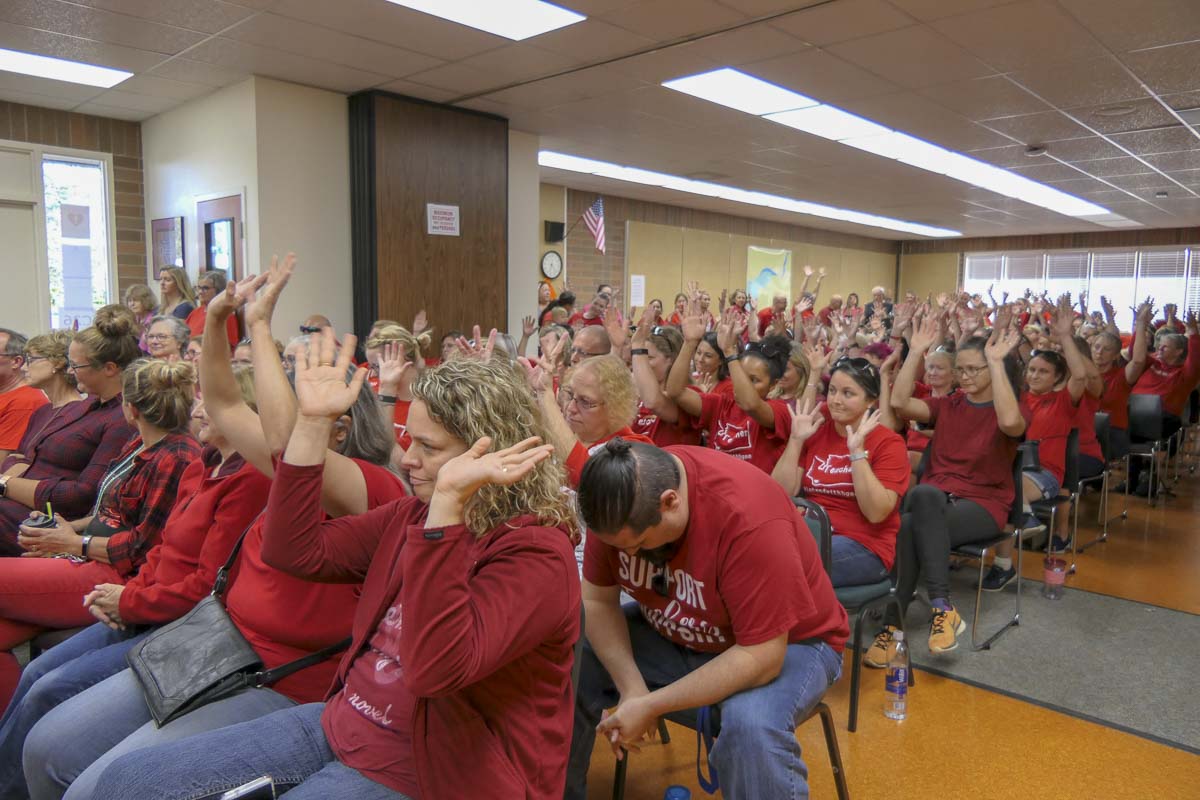Seven districts are on strike, with Camas set to follow suit if a deal isn’t reached by Monday
CLARK COUNTY — Thousands of Clark County school children will not be going to school on Wednesday, as hundreds of teachers across the region head out onto the picket lines.

None of the districts still trying to settle the question of how much teachers should be earning in the wake of the legislature’s funding boost this Summer have reached a deal yet. That means only La Center schools will start on time.
Teachers across the state have been pushing for raises from 15-25 percent following the legislature’s decision to provide an additional $2.1 billion in funding over the next two years. Districts say the legislature’s decision to also cap local levies means they’ll be facing a budget deficit at the start of the new year.
In fact, House Bill 2242 included a series of provisions intended to head off just this situation, but they seem to have been largely ignored by the Washington Education Association (WEA), which is accusing superintendents across the state of withholding money earmarked by the legislature to fund raises for teachers (see pages 74-76 here). The provisions read, in part, “A school district collective bargaining agreement that is executed or modified after the effective date of this section and that is in effect for the 2018-19 school year may not provide school district certificated instructional staff with a percentage increase to total salary for the 2018-19 school year, including supplemental contracts, that exceeds the previous calendar year’s annual average consumer price index, using the official current base compiled by the bureau of labor statistics, United States department of labor, for the city of Seattle.”
The same applies for certificated administrative staff, as well as classified staff.
Meanwhile, some school boards are considering moves designed to put added pressure on teachers to make a deal sooner rather than later. The Vancouver school board, in a special session on Tuesday, debated several resolutions that would lock teachers out of classrooms, considered their strike to be an unexcused absence that could lead to termination, cut off pay after Sept. 10, and cut off healthcare premiums after Sept. 17. In a statement, Superintendent Steve Webb said they don’t plan to take such drastic actions immediately, but see them as “contingency resolutions”.
“Friends, we don’t have a choice in this matter,” Webb’s statement reads. “State law prohibits the gift of public funds. Every VPS employee, including me, must be at work 50% of the available work days in a month, including use of approved leave, to receive their monthly premium payment.”
Evergreen School District has taken similar measures, and both districts could consider a lawsuit seeking an injunction to force teachers back to work, likely arguing that the strike causes material harm to the people of the district, as well as the schools themselves.
Increasingly, districts and education association presidents alike have laid much of the blame for this impasse at the feet of lawmakers who passed the McCleary funding.
“Unfortunately, the complex and inequitable funding system adopted by the legislature in response to the McCleary lawsuit is making the process of bargaining teacher contracts exceptionally difficult for districts throughout the state,” said Vancouver School Board president Rosemary Fryer in a statement released Tuesday. “The failure of elected leaders in Olympia to avoid pitting unions and districts against each other has been divisive and disruptive to many communities throughout the state. These divisions are harmful to our teachers and staff. They are harmful to our students and families. And they are harmful to our relationships with the broader community.”
In the midst of all this, more lawmakers are expressing dismay over the state of affairs throughout the state. Vancouver Republican Representative Vicki Kraft, via text, said “The State Legislature voted to increase K-12 funding $8.1B during the past two sessions and these funds will be fully implemented by 2021. As a result, K-12 funding now makes up 52% of the State’s General Fund Budget. Given these facts, it’s very unfortunate to see these strikes taking place.”
Rep. Liz Pike, a Camas Republican who is not running for re-election, said she believes legislators will be back next year, seeking to overturn the local levy cap because school districts will have spent all the extra money given to them on teacher salaries, and not have money to fulfill the other part of the McCleary mandate, which was to reduce class sizes.
In separate statements, pretty much all of the districts said they will continue to hold bargaining sessions in an effort to reach a deal. State mediation through the Public Employee Relations Committee has been requested by nearly two dozen school districts across the state, including nearly every district in Clark County.




